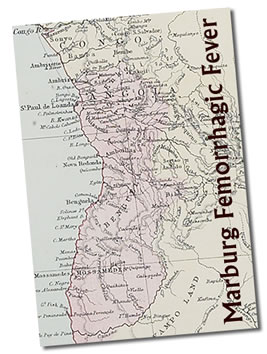Apr 25 2005
 Medical teams attempting to control the worst outbreak ever recorded of the deadly Marburg virus in Angola are beginning to see the light at the end of the tunnel as cooperation from stricken communities improves, the U.N. health agency said.
Medical teams attempting to control the worst outbreak ever recorded of the deadly Marburg virus in Angola are beginning to see the light at the end of the tunnel as cooperation from stricken communities improves, the U.N. health agency said.
Experts say that efforts to educate communities about the disease and about the need to isolate patients both when they're ill and after death, are beginning to payoff at last with medical teams encouraging greater cooperation by being more sensitive to villagers' fears.
The virus, which is closely related to the feared Ebola virus is spread through direct contact with body fluids, and has caused hemorrhagic fever in 266 people and killed 244 of them since March, when the outbreak first came to the attention of health authorities.
Dr. Fatoumata Diallo, the World Health Organization (WHO) representative in Angola, says the news is good but does not mean the outbreak is over.
The WHO says that as communities begin to understand the dangers of the virus the number of new cases has dropped from an average of 35 per week to 15.
Dr. Mike Ryan, the WHO's top outbreak specialist at the agency's headquarters in Geneva, Switzerland, says that the "chain of transmission is being broken as we speak" and this is the most critical time now in the response to the outbreak.
Outbreak team leader, Dr. Nestor Ndayimiridje says the community response has improved very much, and now traditional leaders are coming to the office to report suspected cases or dead bodies unlike two weeks ago. He says only one community remains hostile.
Earlier in the outbreak, suspicious villagers threw stones at medical teams when they arrived to search for infected people and collect bodies. Families hid sick people and buried the dead secretly in traditional rituals that risked spreading the disease because they involved touching and bathing of the corpse.
Adding a more human touch to their actions and interactions with the community so villagers do not feel the teams have arrived as "sanitary police," has helped medical teams get the job done, says Dr. Pierre Formenty, the WHO's Marburg virus expert.
Plastic sheet fences around isolated wards have been lowered so that people can come and see what we are doing, Formenty said. Many link the use of plastic barriers to death and think that plastic around the place to isolate the ward, shows that you are going to kill them.
Ndayimiridje says they have tried to humanize the safe burial of the bodies, allowing the families to assist from a certain distance, and doctors now refer to the isolation wards as treatment wards, and allow one relative, fitted with a bio-protective suit, to visit their sick family members.
Formenty says there is now evidence that the families understand that the disease is transmissible, they have just one or two people taking care of the sick patient, and know that they must not touch the bodies.
Now that communities are reporting the cases, the team has started to focus on prevention measures.
Injecting of medicines could be playing a role in transmission, and the experts have started a campaign warning of the dangers of reusing needles, Formenty said. The society in Uige, where most cases have occurred, favors injectable medicines over pills.